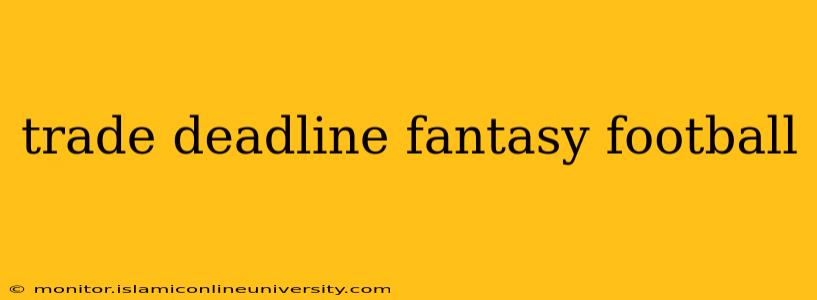The fantasy football trade deadline is a crucial juncture in your season. It's your last chance to significantly reshape your roster before the playoffs, transforming a struggling team into a contender or solidifying your position at the top. But navigating the trade market successfully requires strategy, foresight, and a keen understanding of your league's landscape. This guide will equip you with the knowledge to make savvy trades and boost your chances of winning the championship.
What is the Fantasy Football Trade Deadline?
The fantasy football trade deadline is the point in the season after which trades are no longer permitted. This date varies from league to league, but it typically falls around Week 8 or Week 10 of the NFL regular season. Missing this deadline means you're stuck with your roster, regardless of injuries or poor performance.
Why are Trades Important in Fantasy Football?
Trades offer a significant advantage in fantasy football. They allow you to:
- Address Weaknesses: Identify and acquire players at positions where your roster is underperforming.
- Capitalize on Opportunities: Trade away players whose value is peaking before it declines due to injury or a change in team dynamics.
- Acquire Star Players: Target high-performing players from other teams who might be willing to part with them for the right compensation.
- Improve Your Team's Ceiling: Upgrade your roster to better compete against top teams in your league.
What Makes a Good Trade?
A successful trade is mutually beneficial. It's not just about getting the best player; it's about getting the best value. Consider these factors:
- Value Assessment: Accurately assess the current value and potential future value of players. Utilize tools like fantasy football projections and player rankings.
- Need vs. Want: Identify your team's most pressing needs and prioritize trades that address those weaknesses. Avoid emotional trades driven by "wants" rather than strategic needs.
- Negotiation Skills: Be prepared to negotiate and compromise. Don't be afraid to walk away from a deal that doesn't benefit your team.
- League Context: Consider your league's scoring system, the performance of other teams, and the players available on the waiver wire.
How to Identify Potential Trade Partners?
Identifying potential trade partners is key. Look for teams that:
- Have Surplus at a Position: Identify teams with an abundance of players at a particular position, potentially indicating willingness to trade.
- Need a Player You Can Offer: Look for teams whose weaknesses align with your strengths. This allows you to offer a valuable player while simultaneously addressing your own need.
- Are on the Verge of Giving Up: Teams experiencing a losing streak may be more inclined to make trades to improve their roster.
What Factors Should I Consider Before Making a Trade?
Several factors must be considered before making any trade:
- Byes: Be mindful of players' bye weeks. Avoid trades that leave you short-handed during crucial weeks.
- Injuries: Assess a player's injury history and current status. Incorporate injury risk into your valuation.
- Team Schedule: Consider the upcoming schedule of the team the player is on. A favorable schedule can significantly increase a player's value.
When Should I Make a Trade?
Timing is everything. Generally, making trades before your team's bye week is advantageous, allowing you to avoid roster gaps during that crucial period. However, the optimal time to trade might depend on the league and your specific team's needs.
What are Some Common Trade Mistakes to Avoid?
- Overpaying: Avoid giving up too much value for a player, especially if the player's value is based on recent performance.
- Emotional Decisions: Avoid making rash trades based on emotions. Use data and analysis to make informed decisions.
- Ignoring Future Value: Don’t solely focus on current performance; consider the player’s projected value for the remainder of the season.
- Ignoring Bye Weeks: Failing to account for bye weeks can significantly impact your team's performance.
How Can I Improve My Chances of Making a Successful Trade?
- Research: Thoroughly research players' past performance, current form, and future potential.
- Communication: Communicate clearly and professionally with potential trade partners.
- Patience: Don't rush into a trade. Be patient and wait for the right opportunity.
- Flexibility: Be willing to compromise and negotiate.
By following these strategies and avoiding common pitfalls, you'll significantly enhance your chances of making a successful trade that propels your fantasy football team towards a championship. Remember, the trade deadline is a crucial part of the fantasy football season, so plan ahead and utilize it wisely!
